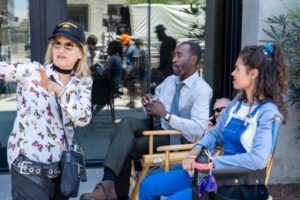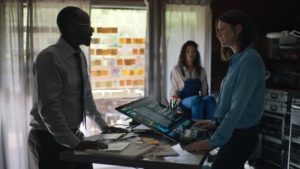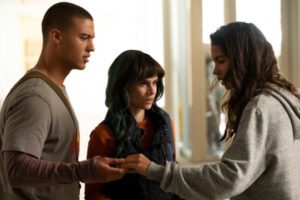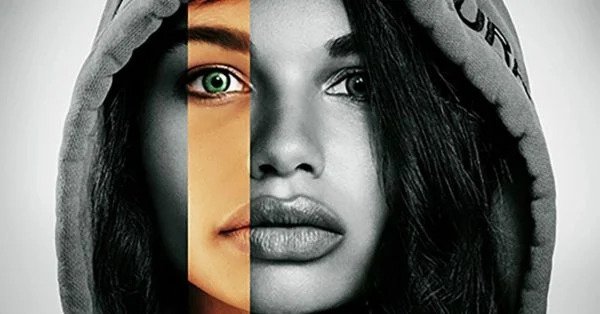Martin Carr speaks with director Catherine Hardwicke about Quibi’s Don’t Look Deeper…
Catherine Hardwicke has been a production designer for Cameron Crowe and David O. Russell, as well an acclaimed director with Lords of Dogtown, Thirteen and of course Twilight. Recently she took time to discuss her involvement in Quibi’s Don’t Look Deeper. A tale of teenage angst set in a dystopian future where growing pains means something else entirely…

What first attracted you to the material?
I was drawn in by the joy of this teenage girl and her journey of self-discovery. The complexity of these emotions was such a great challenge, both in terms of getting that on screen and then finding an actor who could really make it believable.
From cast and crew through to corporate how did you find the collaborative process from a creative point of view?
Quibi was very supportive and I think we were only the second dramatic series to start shooting so there was a smaller crew then. When I first met with them they had six people which grew into three hundred by the time we came up with something. So that was the exciting thing right off the bat, being involved in this entirely new industry but run by very experienced people. They were all super smart and very encouraging around the creative world building, so it was very positive all along.
From your perspective how do you think the Quibi platform enhances the story telling process?
Actually I found it very invigorating because it fits provocative stories into ‘quick bites’ of ten minutes and takes advantage of our down time. However, what that forced me to do was find innovative ways to launch the beginning and end of each new episode. I found it made things more dynamic by pushing the creative elements and making episodes more challenging, which I kind of loved it.

How did you adapt your process to account for the episodic nature of this material?
In a weird way we shot this as a film because unlike other episodic television you only have one script at a time. With television you are basically one or two scripts ahead and each one has their own director, but in this case I directed them all. So we would go to the house or school and shoot all those scenes and it was basically like block shooting a feature film which I am used to doing. The only thing was that some of these scenes would not run as scenes, but be inserted into ad breaks and some would be the opening shot of a new episode. When we had to fit everything into ten minutes that dictated things slightly, because not every story fits exactly into that format so things got changed in the editing room.
What do you think are the primary differences between shooting for this platform as oppose to film or television?
A big challenge was the vertical and horizontal aspect. When we signed on we were told it had to be shot both ways and being a painter I had paintings in the vertical portrait format. However, as a film maker I had never tried to do a two shot in the same way. So the challenge came in trying to get two actors in the same frame which was hard while three was harder still. So the learning curve for both myself and my cinematographer was extreme in trying to make it work.
In terms of the performances with your principle actors, what were the initially conversations like?
We talked about how to keep it grounded and believable, whilst the exploration of technology and how that affects us was already going on in our lives. We touched on how we deal with technology and love or hate certain elements of it which was brought into the story. Don (Cheadle) is a very experienced actor with writing, producing and directing credits who along with Emily (Mortimer) dove right into their characters. Of course there were lots of creative comments and ideas which is the fun of collaborating with these wonderful actors, who discover new layers to a character during discussions and rehearsals. That this then gets written right into the script is great because they are all really good at being both spontaneous and creative. They know exactly what they would do and not do, how they would behave and what they would wear so it was a lot of fun.

How do you think technology continues to impact and shape our society?
That is so much what this story is about, because it is an ongoing challenge in terms of all the things it can give us. Tools which allow us to do things we could never have done even three months ago. We have screen sharing now and really cool ways to communicate which allow us to talk. In the creative process, in the physical sense, and then in our case in terms of A.I and machine learning. So I think it’s a great ongoing dialogue to think about and discuss.
Having worn so many creative hats in your career what elements do you personally weigh up before signing on to anything?
I do like something which is going to be visually invigorating. My background as an architect and designer draws me towards projects which are enticing and exciting, as well as grounded or visually stimulating. As both a production designer and director you are always thinking about adding layers to a character through the visual medium, both in terms of location choice and decoration. I like to be intellectually and emotionally stimulated as well as visually, because this can connect me to the character. With Twilight I hadn’t seen the idea of a really intoxicating young love story on film and the challenge was whether I could do something which could live up to the book. With Don’t Look Deeper the challenge was getting people to love someone who is so different from anyone else you might meet on the street.

Can you describe for me your perfect Sunday afternoon?
It would be in the ocean with a pod of dolphins that would be swimming by, who would stop and play with me for an hour or so just diving through the waves. That might be kind of perfect.
Thank you very much for your time Catherine and be well and stay safe.
Don’t Look Deeper streams on Quibi from Monday July 27th.



